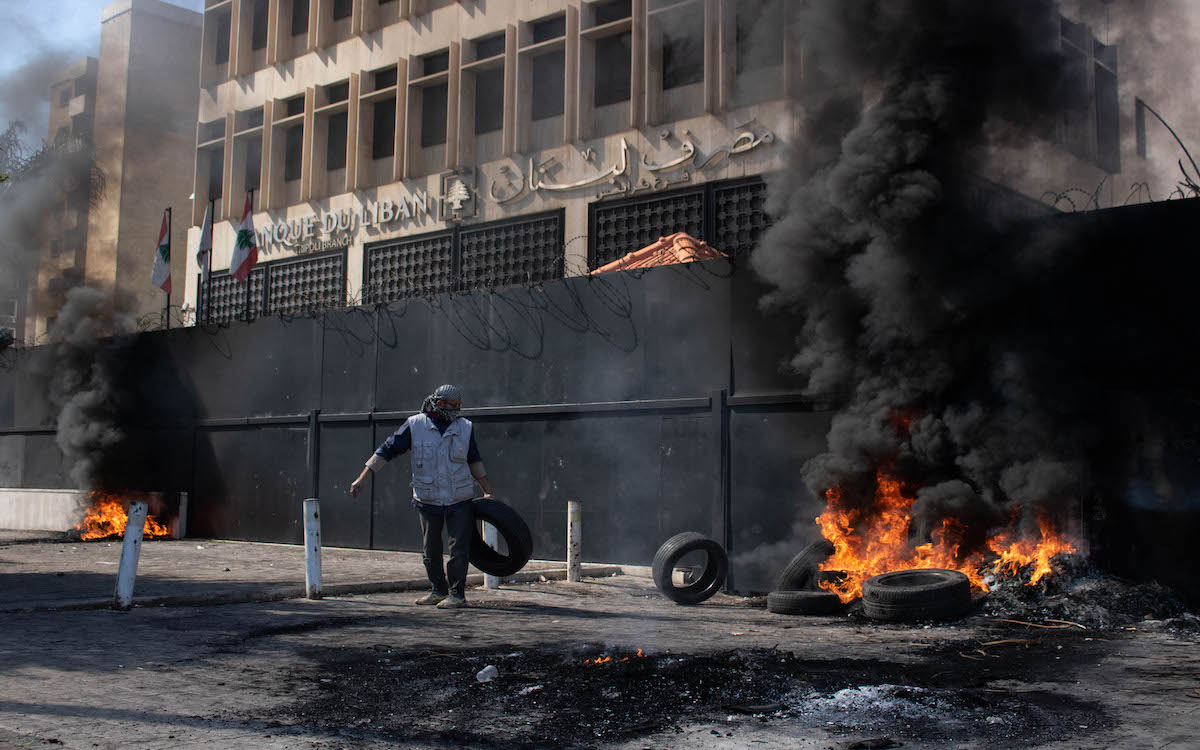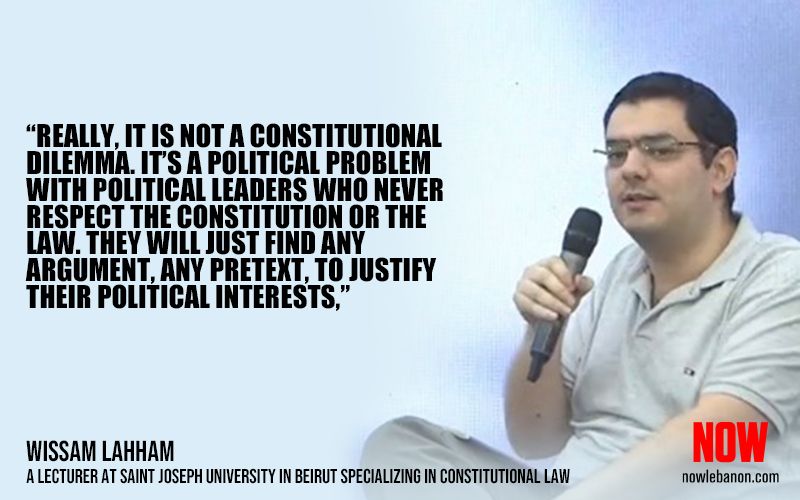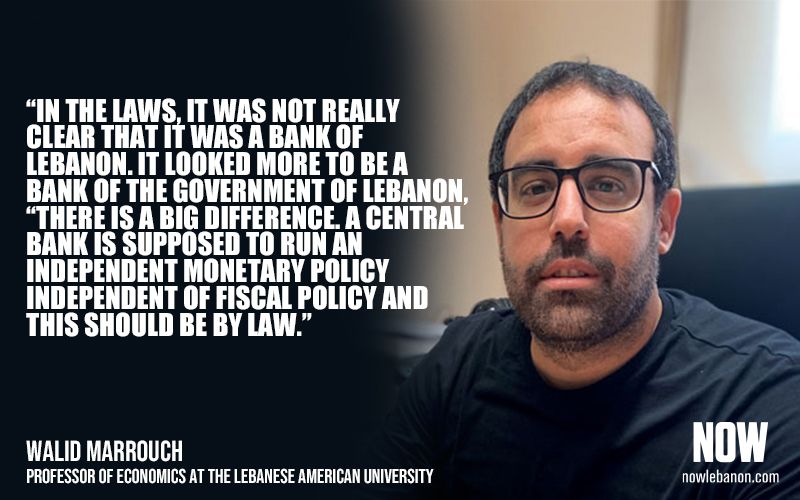
After 30 years, Riad Salameh is finally stepping down as the head of Lebanon’s Central Bank (BDL) when his final six-year term comes to an end on July 31.
The BDL head, who was once touted in the West as being a financial wizard and was the first Arab central bank governor to ring the starting bell at the New York Stock Exchange in 2006, is leaving his post far from where he started.
Plagued by investigations in Lebanon, France, Germany, Luxembourg and Switzerland for alleged financial crimes, Salameh’s name has become more synonymous with the ongoing financial crisis in Lebanon, which the World Bank has called one of the worst that the world has seen in 150 years, now in its fourth year.
The BDL head leaving office normally means that the president would nominate someone to fill the position. But, Lebanon has been without a president for 269 days since Michel Aoun’s term came to an end on October 31, 2022, and Najib Mikati’s government is currently only operating in a caretaker capacity.
Mikati has met with the vice governors of the Central Bank in recent weeks after they threatened to resign from their posts unless a new governor was appointed in an attempt to avoid a power vacuum at BDL at a time when Lebanon is already struggling.
According to Wissam Lahham, a lecturer at Saint Joseph University in Beirut specializing in constitutional law, since the current political situation constitutes an extraordinary circumstance, it is clear what is supposed to happen next.
“In this case, you can say that the Council of Ministers can convene even if it is a caretaker government and appoint a governor and vice governors because, in this case, you will be in a very exceptional situation,” he told NOW.

The question of succession
When it comes to practically every government institution around the world, there is a line of succession in place so that in the event that the head of a specific department is unable to fulfill their duties, there is clearly a successor to take their place either in a permanent capacity or temporarily until a new head can be appointed.
BDL is no exception.
The governor of BDL is required to be a Maronite according to Lebanon’s power-sharing rules, with four vice governors under him – a Shiite first vice governor, a Druze second, a Sunni third and an Armenian Orthodox fourth.
According to Lahham, since Salameh is leaving office and no one has been appointed to fill the role, what should happen next is clear: the first vice governor, in this case Wassim Mansouri, should take over as the head of BDL and assume all of its responsibilities until a new governor can be chosen.
This, however, was called into question at the start of July when all four vice governors told caretaker Deputy Prime Minister Saade Chami that they would resign from their posts if a new governor was not appointed by the end of the month.
There are a few possible outcomes to this situation.
The first is that the line of succession continues until someone is willing to fill the post.
According to Walid Marrouch, a professor of economics at the Lebanese American University, this could have a negative impact on the economic situation in Lebanon as the further down the line of succession, the less experience the potential successor would have, and having no clear successor would cast uncertainty on the economy.
Other possible outcomes, according to Lahham, depend on how the caretaker government responds to such a situation.
“If they all resign, generally, their resignation needs a decree that will accept their resignation – a decree that should be decided on in the Council of Ministers,” he explained. “If they resign and no such decree is decreed, in this case, they can remain in their posts.”
However, there is also the possibility that the vice governors could just submit their resignations and refuse to work even without the government accepting their resignations, creating a total power vacuum at BDL.
In this case, Lahham argued that the government, even though it is technically in a caretaker capacity, would be able to appoint a new governor and vice governors.
“According to the principles of the continuity of public service, even a government that presented its resignation can appoint their successors,” he stated, adding that without anyone leading BDL, “everything in the Central Bank will stop” and that “if there is no governor and first vice governor or acting governor, then even printing money will not be something feasible,” spelling disaster for all of Lebanon.
Even the concept of a caretaker government is not as narrow as many believe.
“There is even a jurisprudence in the Council of State that says that the caretaking should be limited to a brief time,” Lahham said. “When the caretaking is not limited to a brief period of time that extends to months and months, the principle of caretaking becomes broad. So, the government is allowed to take decisions that, generally, in a brief caretaking period of one, two weeks. But if it remains for months and months, you can’t just paralyze all state institutions because it is a caretaking government.”
The main problem burdening the question of who will lead BDL, Lahham stated, comes from the politicians refusing to take any action.
While there was initially talk that the government might seek to extend Salameh’s term to prevent any issues of succession, that idea was quickly quashed when Mikati stated simply that the option was not on the table.
But Lahham argues that the political issues run much deeper, and that there is a lack of will from the politicians to actually do anything when it comes to making appointments in BDL and that no matter what solutions are put in front of them, the politicians will find a reason to avoid action.
A primary problem in appointing the next BDL governor is the sectarian issue in the government.
Since the governor is a Maronite, the politicians argue that it should be the president, who is also required to be a Maronite, who appoints someone to that position.
“Really, it is not a constitutional dilemma. It’s a political problem with political leaders who never respect the constitution or the law. They will just find any argument, any pretext, to justify their political interests,” Lahham stated.
The government was set to meet on July 27 to discuss appointing a new governor of BDL but the meeting was ultimately canceled due to a lack of a quorum. Both Hezbollah and the Free Patriotic Movement have said that they are against appointing a new governor before the election of a president.
Gebran Bassil, the leader of the FPM, has been staunchly opposed to the current government taking any major decisions, arguing that it is essentially a power coup by the Sunni-led government on the presidency.
Given the current situation in Lebanon and the unpopularity of Salameh’s policies since the start of the economic crisis, Marrouch argued that the vice governors were playing a game of politics of their own in the hopes that they would be able to wash their hands of him.
“They want to be protected internally by not taking full responsibility,” Marrouch told NOW. “Externally also because the EU is threatening sanctions on people who commit economic and political crimes in Lebanon. So there is this fear of sanctions from abroad; it is a local fear of taking responsibility for the monetary collapse.”

Setting conditions
While Salameh may have helped to exacerbate the issues surrounding BDL, they go back to long before he started his post.
The job of a central bank is to help establish monetary stability and keep inflation in check.
In the United States, when a recession loomed on the horizon, the Western superpower’s central bank adjusted interest rates accordingly to try and prevent that from happening.
That is not what has happened in Lebanon.
“In the laws, it was not really clear that it was a Bank of Lebanon. It looked more to be a bank of the government of Lebanon,” Marrouch explained. “There is a big difference. A central bank is supposed to run an independent monetary policy independent of fiscal policy and this should be by law.”
On July 26, Lebanon’s State Shura Council rejected the government’s request to borrow money from BDL’s mandatory reserves.
The political interference in BDL helped to ensure that the institution was not only not independent, but focused more on financing the government and its needs rather than trying to ensure the stability of the economy.
On top of this, when the economic crisis began it was not the government that implemented policies to try and bring an end to the crisis. Instead, this duty was thrust upon BDL.
It was during this nearly four-year period that some of BDL’s most unpopular policies came into existence. The most notorious of these policies being the limits on monthly dollar withdrawals from the banks which essentially locked depositors out of their accounts.
Another policy was the establishment of the Sayrafa platform, which was BDL’s attempt at trying to unify the various exchange rates, which it has failed to do. It has had some success, however, in providing some stability to the, at times, volatile black market exchange rate.
“In some aspects, you cannot blame them for that. They are in a tough spot. It is the most dangerous job in Lebanon to be governing the Central Bank or be leading the Central Bank,” Marrouch stated. “Since the crisis started, we have noticed that the government has played no role in economic policy. It was all taken by the Central Bank which violates the principles of basic economics.”
In threatening to resign, the vice governors are hoping that they will be able to negotiate with the government to take on more of the fiscal responsibility.
In a plan to Parliament and the government, the vice governors proposed various financial reforms ranging from a formal capital control law passed by Parliament before the end of August 2023 to a restructuring law. The government is going to meet next Monday to discuss the 2023 budget.
Most notable in the plan, which was seen by NOW, was the replacement of the Sayrafa platform with a new platform that would see the lira floated against the dollar in the hopes that this would help to unify the exchange rates.
Even this, though, could have disastrous results depending on how and when the new platform is rolled out.
“My worry is the transition,” Marrouch stated. “How are they going to transfer from Sayrafa to that platform? Is it going to happen abruptly? Is it going to happen gradually? All of this matters. If it is going to happen in a catastrophic manner, the lira might shoot up again to catastrophic levels that we have not seen before.”
In the event that the new platform is implemented slowly and Sayrafa is progressively phased out, it could actually have a positive impact on Lebanon’s economic situation as long as the new platform is transparent and open to everyone.
Although the vice governors are trying to distance themselves from Salameh and his policies, something that the embattled BDL governor tried to play down in a July 26 speech where he said that their demands have “nothing to do with the Central Bank or the relationship between me and them,” the four vice governors are still political appointees that are, like so many other officials in Lebanon, ultimately beholden to their political patrons.
“We all know that all of them are political appointees. They’re not really technocrats. Some of them are, but mostly become political appointees and you cannot define them anymore as technocrats because they have to report to the political party that appointed them,” Marrouch said.
Mansouri is close to the Amal Movement, a party headed by Parliamentary Speaker Nabih Berri and a key ally of Hezbollah. The second vice governor, Bachir Yakan, balances an alliance with the main two Druze parties in Lebanon, the Progressive Socialist Party, headed by Teymour Joumblatt, and the Lebanese Democratic Party, headed by Talal Arslan. Chahine was supported by former Prime Minister Hassan Diad who was charged by Judge Tarek Bitar in his investigation into the August 4 Beirut port explosion before he was forced to halt the investigation once more in January. Lastly, the fourth vice governor, Alexandre Mouradian, is backed by Tachnag, an Armenian party allied with Hezbollah.
In addition to the vice governors being political appointees, the ruling parties that helped bring about the economic crisis remain in charge, giving Marrouch little hope that Lebanon’s economic future will be much better than it was when the crisis began.
“The same forces that were in charge before the crisis, during the crisis, are still in charge and the same decision-makers who made the mistakes that led to the collapse are still in charge. So unless they go, there is no hope of reform,” he stated.
Nicholas Frakes is a senior reporter with @NOW_leb. He tweets @nicfrakesjourno.








